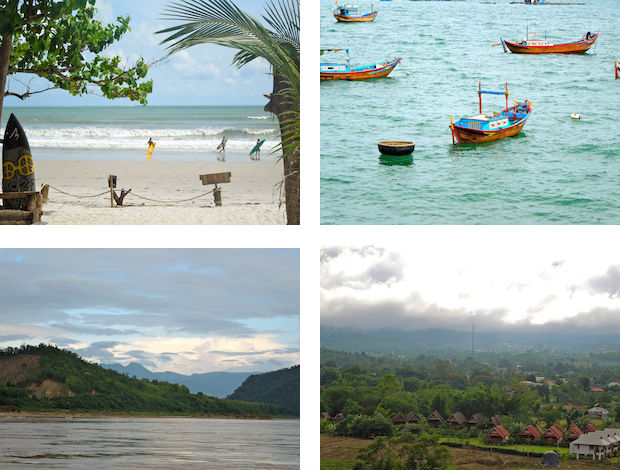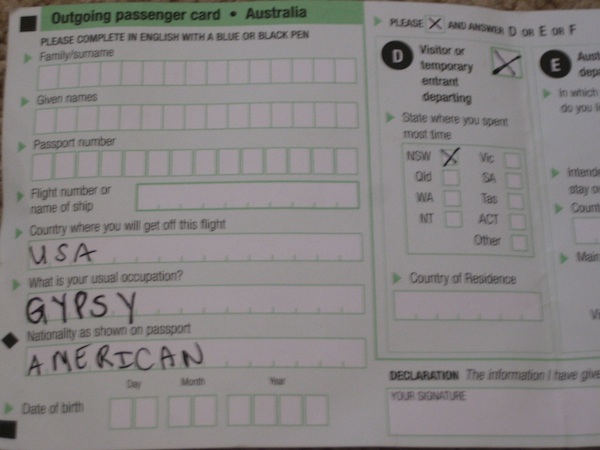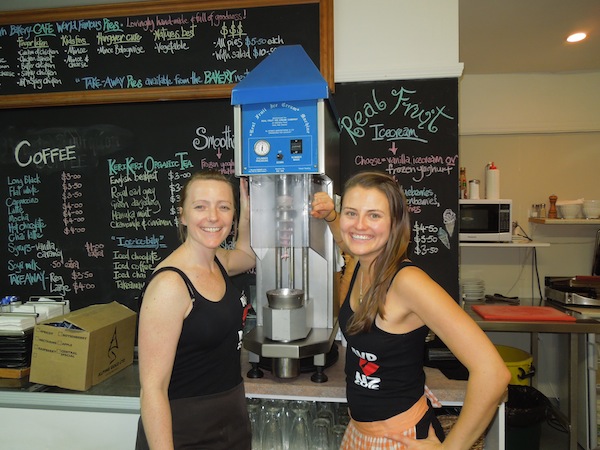I tend to leave a lot of practical information out on this blog. The how-to-get-theres and the how-much-it-costs of travel, the logistics of planning trips, the amount of time I spend getting from point A to point B — hey, I usually even forget to show you where point A and point B are on the map. If I can admit something that should surprise absolutely no one (is it an admission if everyone already knows about it?), this blog is and has always been much more about how travel has changed me personally than it has been about the travel itself.
A number of people close to me have told me that this approach is valid, that there are surely others out there feeling exactly what I feel and longing to do exactly what I’ve been doing, looking for someone to actually identify with. And maybe — hopefully — that’s true. But I also hope there are people out there who are looking — on this blog specifically or anywhere else — for actual, practical guidance on how to pull off a working holiday.* Because in my experience, it’s getting that practical information that finally helps you go from “daydreaming at your computer” to “booking tickets and making plans.”
So today I thought I’d share the most useful bits of advice people gave me during my working holiday — along with the obstacles I wish someone had warned me of, the lessons it took me longer than it probably should have to learn, and the stuff I got used to never figuring out. Obviously, all of this advice is based entirely on my own experiences and on those of friends, acquaintances, and coworkers I met along the way. There are infinite combinations of work, travel, and accommodation options available to working holiday-makers, so obviously I did not experience every one of them, and I’m by no means an expert. But I do firmly believe in all of these tips, and hope that if you’re reading this and are contemplating a working holiday, there’s something useful in here for you. Mostly, I hope something in here gives you one of the many tiny little pushes you might need to get going.
Go forth and Network. In other words: Get out there and meet like-minded people. There are more than you think, and just talking to them, just being around them, can give you that little push you might need if you’re thinking about long-term travel of any kind. In 2011, after I’d quit my job in New York and was waffling between settling down in California or heading across the Pacific for a year, I signed up for an event called Meet Plan Go. It’s an annual meeting held in cities all over the U.S. for anyone considering long-term travel, and includes panel discussions with successful vagabonds, practical information on necessaries like travel insurance and budgeting, and a chance to meet other people interested in life on the road. When I showed up to the San Francisco meeting two years ago, I expected to be one of about five attendees. Instead, there were over 100 of us, ranging from teenagers to parents to retirees.
When you’re the only person you know who’s seriously considering a gap-year or a round-the-world trip or a working holiday, a lot people are going to say you’re crazy — and occasionally you’re not going to be able to help believing them. So I cannot overstate how reassuring it is knowing how many real-life, like-minded people are out there. And there are plenty of other ways to get to know them: there are about a jillion blogs out there by long-term travelers and working holiday-makers. There are groups of travelers who coordinate meet-ups on CouchSurfing. There are people like yours truly who’ll do their best to answer your questions.
“I don’t know” is a perfectly good answer. (Or, as put another way in a blog post I was delighted to stumble upon this morning, “Everything is Figureoutable.”) Once you’ve decided to go on a working holiday, everyone — and I mean everyone — is going to want to know what the hell your plan is. If I had a dollar for every incredulous relative, friend, and perfect stranger who pressured me for concrete details before I left for New Zealand, I could have paid for my flight out there. A few weeks before I left, I even got a lecture from an overly nosy cashier at my local Trader Joe’s, who “strongly urged” me to find a job Down Under before leaving home. These situations are inevitable, but don’t let them freak you out. Just remember this: It will all start to make sense when you get there, and not a minute before. I promise. Get used to saying “I don’t know” or “I’ll figure it out,” and people — yourself included — will get used to accepting them as valid answers.
Save your money now so you don’t have to later. This must seem painfully obvious, so I won’t dwell on it. But seriously: that cute top that caught your eye in the store window, another night out at the bar, your favorite $9 salad for lunch — you will not remember having missed out on these things when you’re spending your savings on local beers with new friends, spur-of-the-moment adventures, or even set-up costs when you find a new place you want to call home for a while.

This kayaking trip on the Coromandel Peninsula brought to you by money I saved up doing freelance work for my old company before I left home.
But don’t be fooled into thinking you have to be loaded. I’ve been working on filing my New Zealand taxes since I’ve been home. Want to know how much it turns out I earned, before taxes, the entire year I was in New Zealand? NZ $7,077. Yes, I did have some U.S. savings I was able to dip into when I needed it — notably to buy my ticket to New Zealand in the first place and to travel around the country before and between jobs there. But once I started working, I was able to live off of the money I earned locally. How? By getting both creative and lucky.
Working for accommodation — which I did for the bulk of my time in NZ — cuts out your biggest daily expense. If you get to a place you like, just ask if they have any work for accommodation openings. It’s that easy. And working in restaurants can often mean free meals: In Queenstown, I ate free curry for dinner every night for four and a half months and worked for my accommodation. This meant I got by comfortably in one of the country’s most expensive towns even though I often only did a few hours of paying work per day. In Arrowtown, Hayely and I worked for accommodation while putting in full-time, paying hours at a bakery that gave us free breakfast and lunch every day. More than just making ends meet, we saved enough money in just a few months to fund a lengthy holiday in Southeast Asia. Another great way to get by with very little money is WWOOFing. My own experience WWOOFing was more limited than I would have liked, but I’ve met plenty of people who’ve traveled pretty extensively by trading a few hours of farm work per day for room and board.
Bottom line: yes, you need money saved up to get yourself started and to fill in the gaps sometimes. But you don’t need to be a millionaire in the first place, nor do you need to be raking in the dough abroad, to make a working holiday work for you.
Don’t be afraid to try out jobs you’d never consider back home. Someone told me this mere hours after I landed in New Zealand, and it turned out to be the best piece of advice I received on my working holiday. Whatever it is you’re accustomed to doing for work, there’s no reason you have to do the same thing on a working holiday. In fact, I’d argue, what’s the point of taking a year “off” to do exactly the same thing you’re used to doing? To be fair, I have met people — notably accountants, chefs, and ski instructors — who have scored positions in their fields on working holiday visas. And I don’t discount the stability and maybe even happiness that kind of decision can provide. But had I not stopped worrying about my fancy college degree and my carefully cultivated CV and taken a chance working at a bakery, an Indian restaurant, or a hostel, my working holiday wouldn’t have been nearly as eye-opening, transformative, flexible, or liberating as it ultimately was. And I know lawyers, teachers, banking analysts, Master’s Degree-holders, and former medical secretaries named Hayley who would tell you the exact same thing. Allow yourself to try new things and just remember that real life will always be waiting for you right back where you left it — if you still want it, that is.
You can’t be too friendly. Fact: I never held a job in New Zealand that asked me for a CV. Hayley and I landed our first jobs because she’d been chatting with the manager of our hostel and he’d alerted her to openings at the local bakery. That bakery hired us 20 minutes later based solely on the facts that we showed up in person, were polite, and spoke English. I ended up working at a hostel in one of the coolest destinations in the world (check out #27!) because I’d had a few friendly conversations with the hostel owner and he thought I might be worth taking on. And my waitressing gig? I’d met and befriended the girl who’d just vacated the position; her name was the only information I provided before being offered employment. Even my short-lived WWOOFing gig came to me because, the farm owner told me, I looked enthusiastic in my picture on the WWOOFing website.
Am I saying you should leave everything to dumb luck and a smile instead of actively pursuing jobs and handing out your CV? Of course not. But you never know where a job, a home, or a connection — not to mention a friend — might come from. So don’t hesitate to talk to everyone you meet, let them know if you’re planning on sticking around, and be open to their suggestions.
Be flexible. Fall instantly for the town you were just supposed to be passing through? Hang around a few days and ask locals about jobs. Get offered a job you’re not sure about? There’s no harm in trying it out for a week. Have a sudden inclination to use your newly earned cash on a trip you’d previously never even dreamed of taking? Why not! The thing is, if you’re thinking of taking off for a year in the first place, you’re probably not too tied down to convention. But if you’re anything like me, you’re still going to have an inner voice pestering you to be “practical” and stick to some nebulous plan. Don’t listen to it. You’re not diving into the unknown in order to follow the “rules” — you’re doing it to make your own.
Don’t buy a round-trip plane ticket (if you can help it). This is a good follow-up to “be flexible.” Buying that great round-trip fare you just found might seem like a smart, money-saving measure now, but you’re not going to be thinking of it that way six months or a year from now. Instead it’s going to be a deadline, a pre-purchased obligation, and a financial nightmare to change. By the time I finally decided to come home, the return leg of my “flexible” and “extendable” round-trip ticket would have cost me more to change than I ended up paying to just get a new ticket on a different carrier. And I’ve met lots of other people who’ve had to eat their return ticket cost when they’ve fallen in love with a new country and ended up staying longer than anticipated. Beyond that, waiting to book your return flight means you’re not tied down to a specific point of exit or entry. It leaves you free to decide you want to travel after your working holiday, to fly home out of Bangkok or Fiji or arrange a layover Paris on your way back. I know this may sound unrealistic, but trust me — it happens all the time.

What do all these places have in common? Before I left for a working holiday, I had no idea any of them even existed, much less that I’d one day visit them.
Don’t forget the “holiday” part of “working holiday.” After arriving in Auckland, half the people in my BUNAC orientation group stayed put. Months later, after seeing the whole of New Zealand, working two different jobs, and then quitting them, Hayley and I passed through Auckland on our way to Australia and Asia. We ran into people we’d met fresh-off-the-plane that first day who were working in bars, temping, taking the bus back to their apartments each night. None of them had managed to leave Auckland yet; all of them were hoping for a free weekend at some point over the next few months so they could go to the Coromandel Peninsula or Wellington or somewhere even for just a few days. It can make sense to settle down and earn some money before you go off traveling, sure. But remember to allow yourself enough time and freedom, whenever you can, to see your new country. It reminds you you’re someplace new, helps you get to know the country and culture better, and makes eventually settling down that much nicer.
Know what you need. Speaking of BUNAC: Before I left for New Zealand, I signed up with a program called BUNAC (other countries have SWAP and IEP… they’re all the same concept). The idea behind the program is that it’s sort of a support system. You pay a set fee, then BUNAC will help you get your visa, put you up for a few nights when you get off the plane, tell you a bit about working in your new country, and that’s pretty much it. They don’t help you find a job or a place to live or anything concrete like that. So a few people have asked me if, in retrospect, I thought it was worth paying the program fee to join.
The answer? Yes and no. Depends on who you are. In reality, you do not need BUNAC or anyone else to file your visa application for you (at least not in Australia or New Zealand). You don’t need them to set up your tax and bank accounts when you get there (though they can expedite the process), and you could probably find all the information they give you with a couple of hours of Googling. In the end, having a place (the BUNAC office) to go immediately after arriving in New Zealand gave me some peace of mind before I left home, when I had absolutely no idea what I was doing. I don’t know how much I’d say they actually helped on-site, but I definitely slept a lot better before I left home knowing I had something — however vague — in the works. If that’s something you think would help you, then I say go for it. But if you’re feeling completely independent and confident, save your money and go it alone.
Just make it happen. Over-thinking will not help (trust me, I’ve been trying it for 30 years). Over-planning will prove futile. Putting a trip off, just about any traveler will tell you, is a great way to make sure it never actually happens. So if you’re considering a working holiday — if you’ve made it all the way up to the edge — try jumping. (Or let someone push you). Because, you know what?
*It’s weird for me to remember now, but a lot of people don’t know what a Working Holiday is. I find this is especially true in the US, where taking a year off to travel is not as common as it is in a lot of other countries. So we’re all on the same page here, a Working Holiday visa allows you to live and work in another country for a limited amount of time (often a year). Different countries have different rules for what kind of work you can do and for how long, but the basic idea is that you’re working to fund your travels. People on working holidays can and sometimes do end up finding jobs that agree to sponsor them (keep them in the country longer) once their year’s up, but the working holiday visa itself is meant to be casual and fixed-term.
If anyone else has tips for Working Holidays, I’d love to hear them in the comments section!






Great post. I am working in Bali right now but heading to Australia in June with for a working holiday visa. Makes me want to go right now! ha
Best of luck for your working holiday! You’re going to have an incredible time!